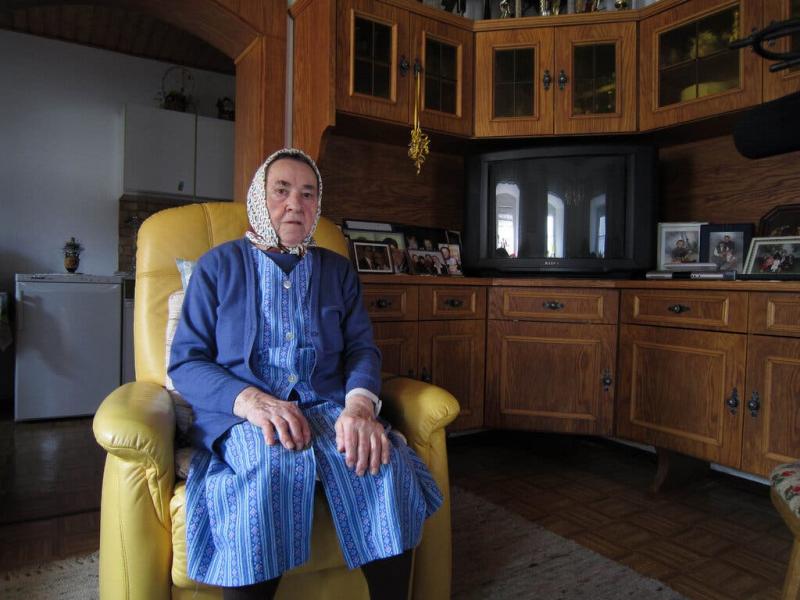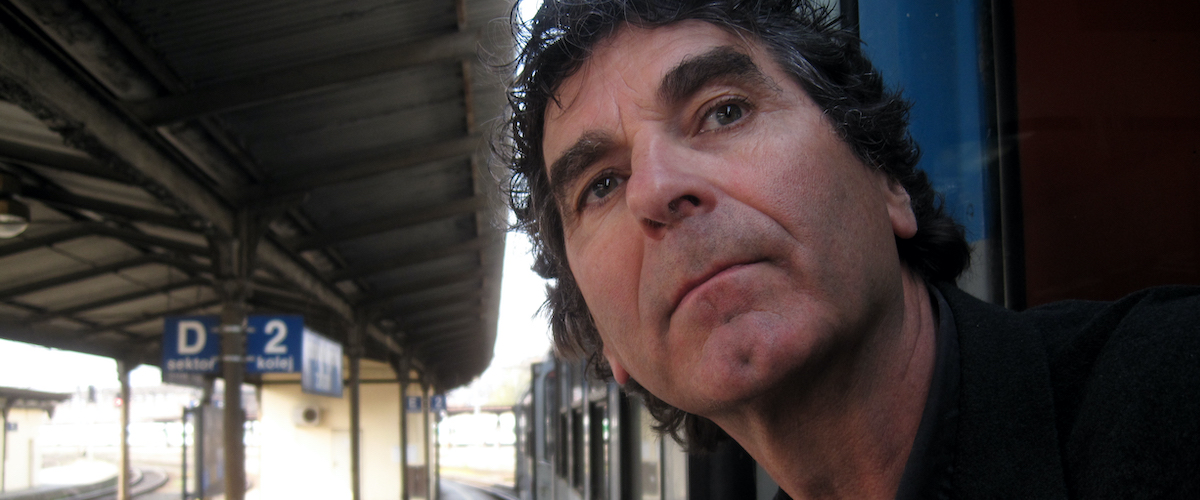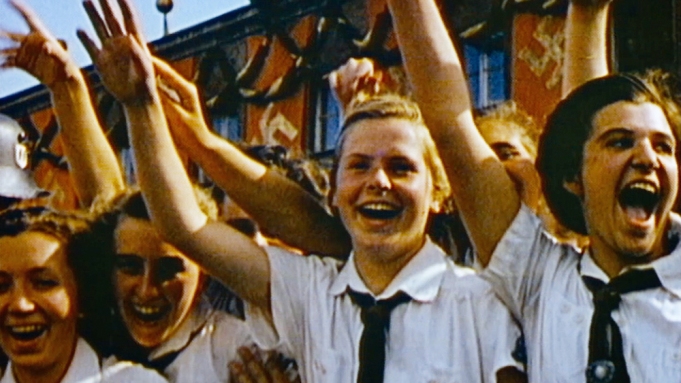Final Account: Storyville, BBC Four review - confessions of the last survivors of the Nazi era | reviews, news & interviews
Final Account: Storyville, BBC Four review - confessions of the last survivors of the Nazi era
Final Account: Storyville, BBC Four review - confessions of the last survivors of the Nazi era
Luke Holland's final documentary is a searing examination of Hitler's Germany

Do we need another documentary about Nazi Germany? Yes, when it is as cogent and subtle as Luke Holland’s Final Account. Made over eight years while the veteran film-maker was battling with the cancer that killed him in 2020, it’s a tapestry of interviews with the ageing generation who lived under Hitler, a last chance to put them on camera.
Holland, whose maternal grandparents died in the Holocaust, is intent on showing us ordinary folk, functionaries not monsters. These are regular people once enchanted by Nazism, now living in comfortable retirement in cosy houses or salubrious nursing homes. One sings a charming children’s song about sharpening the knife to put in a Jewish belly and recalls how bells rang throughout Germany when Hitler came to power.
The director interviewed around 300 people during his long quest to understand what happened. He whittled their number down in the edit suite and those we meet on screen are compelling.There are no expert historians guiding us through, just German and Austrian citizens remembering their heyday. Final Account follows a chronological thread, from the Kristallnacht pogrom in ’38 that saw Jewish synagogues, homes and business destroyed. It touches on the psychiatric hospitals which became killing centres for 100,000 disabled Germans, a precursor to the gas chambers in the camps.
One interviewee remembers seeing the disabled being brought to the hospital in buses with painted windows. They knew from the smell of the smoke what was happening to them. Industries used slave labour prisoners from the camps – mining, chemical works, submarine construction. The staff from nearby camps enriched the local economy with their need for food, lodgings and entertainment. Good times. Holland doesn't dwell on the horrors inside the camps themselves but near the finale we see colour photos of prisoners’ emaciated and frozen corpses on the snowy train tracks, photographed by the Allies toward the end of the war.
The interviewees were mostly filmed at home surrounded by photos on the wall of family members, Madonnas and memorabilia. Looking through an old album full of pictures of smiling little girls, Margarete Schwarz remembers her job as a nanny for an SS family. She was 14 when she started and looked after them for six years while both parents worked full time in Melk camp. She smiles to show off her gleaming teeth – one of her job perks was getting them fixed by prisoner-dentists in the camp.
It is fascinating to watch the fleeting changes in expression in each interviewee's face as they speak; we can see them cautiously gauging the Holland's reaction to their admissions. These former SS officers and camp book-keepers, neighbours and farmers, choose their words so very carefully. They try to rationalise their behaviour, deny knowledge, and justify their accounts of standing by or indirectly aiding the murder of millions.
We never see Holland (pictured above) on screen and although we hear his voice asking questions, there’s no authorial voice-over, just carefully deployed informative captions. But the director’s presence is so strong I found myself looking closely at his subjects' eyes to see if I could spot Holland’s face reflected in their pupils. He was not only a great investigator, tracking down so many diverse witnesses and perpetrators so late in the day, but a great interrogator. He teases out complex, multi-layered answers and edits them all into an elegant, un-showy narrative.
Archive is never used just as wallpaper to cover cuts, simply set up an interviewee or to shock the tired viewer into attention. Masterfully researched by one of the great archive producers, Declan Smith, the footage eschews the overfamiliar atrocities and is subtly deployed.There are scenes of young German boys and girls who joined the Hitler Jugend and Bund Deutscher Mädel for fun, camaraderie, fitness. Images of happy girls picnicking at youth camps, athletic boys diving joyously into a pool are cut close to an elderly interviewee describing how as a nine-year-old, he was ordered to form a human barrier outside a Jewish shop to prevent customers going in. He became curious about what was going on inside. He remembers being told that "you can tell a Jew by their stench". Growing up in a village of 170 people with no Jews and no electricity, the locals were thrilled when a mobile cinema came to town to show them anti-Semitic propaganda films.
 There’s one sequence that awkwardly breaks the direct interview style but to powerful effect. Filmed in 2011 at the villa in Wannsee where the Final Solution was planned, former SS officer Hans Werk confronts young Germans, who have been dabbling in neo-fascist politics. He wants them to know the true horror of Nazism. The youths dislike Werk for being ashamed of Germany, one shouts: "Why are you such a coward? You should be afraid of being stabbed by an Albanian refugee on public transport!" Werk retaliates, accusing the youths of cowardice because they insisted their faces were blurred for the camera to disguise their identity.
There’s one sequence that awkwardly breaks the direct interview style but to powerful effect. Filmed in 2011 at the villa in Wannsee where the Final Solution was planned, former SS officer Hans Werk confronts young Germans, who have been dabbling in neo-fascist politics. He wants them to know the true horror of Nazism. The youths dislike Werk for being ashamed of Germany, one shouts: "Why are you such a coward? You should be afraid of being stabbed by an Albanian refugee on public transport!" Werk retaliates, accusing the youths of cowardice because they insisted their faces were blurred for the camera to disguise their identity.
Not all of the SS officers who agreed to talk to Holland are as repentant as Werk. One man, proud of his medal collection, denies outright that six million were killed; he will never accept the verdicts at Nuremberg because it wasn’t a German court. The director lets his words hang in the air to haunt us. Final Account is a masterpiece that puts Luke Holland in the same league as the great documentarian of the Holocaust’s aftermath, Marcel Ophüls. It’s unmissable.
rating
Explore topics
Share this article
Add comment
The future of Arts Journalism
You can stop theartsdesk.com closing!
We urgently need financing to survive. Our fundraising drive has thus far raised £49,000 but we need to reach £100,000 or we will be forced to close. Please contribute here: https://gofund.me/c3f6033d
And if you can forward this information to anyone who might assist, we’d be grateful.

Subscribe to theartsdesk.com
Thank you for continuing to read our work on theartsdesk.com. For unlimited access to every article in its entirety, including our archive of more than 15,000 pieces, we're asking for £5 per month or £40 per year. We feel it's a very good deal, and hope you do too.
To take a subscription now simply click here.
And if you're looking for that extra gift for a friend or family member, why not treat them to a theartsdesk.com gift subscription?
more TV
 Murder Before Evensong, Acorn TV review - death comes to the picturesque village of Champton
The Rev Richard Coles's sleuthing cleric hits the screen
Murder Before Evensong, Acorn TV review - death comes to the picturesque village of Champton
The Rev Richard Coles's sleuthing cleric hits the screen
 Black Rabbit, Netflix review - grime and punishment in New York City
Jude Law and Jason Bateman tread the thin line between love and hate
Black Rabbit, Netflix review - grime and punishment in New York City
Jude Law and Jason Bateman tread the thin line between love and hate
 The Hack, ITV review - plodding anatomy of twin UK scandals
Jack Thorne's skill can't disguise the bagginess of his double-headed material
The Hack, ITV review - plodding anatomy of twin UK scandals
Jack Thorne's skill can't disguise the bagginess of his double-headed material
 Slow Horses, Series 5, Apple TV+ review - terror, trauma and impeccable comic timing
Jackson Lamb's band of MI5 misfits continues to fascinate and amuse
Slow Horses, Series 5, Apple TV+ review - terror, trauma and impeccable comic timing
Jackson Lamb's band of MI5 misfits continues to fascinate and amuse
 Coldwater, ITV1 review - horror and black comedy in the Highlands
Superb cast lights up David Ireland's cunning thriller
Coldwater, ITV1 review - horror and black comedy in the Highlands
Superb cast lights up David Ireland's cunning thriller
 Blu-ray: The Sweeney - Series One
Influential and entertaining 1970s police drama, handsomely restored
Blu-ray: The Sweeney - Series One
Influential and entertaining 1970s police drama, handsomely restored
 I Fought the Law, ITVX review - how an 800-year-old law was challenged and changed
Sheridan Smith's raw performance dominates ITV's new docudrama about injustice
I Fought the Law, ITVX review - how an 800-year-old law was challenged and changed
Sheridan Smith's raw performance dominates ITV's new docudrama about injustice
 The Paper, Sky Max review - a spinoff of the US Office worth waiting 20 years for
Perfectly judged recycling of the original's key elements, with a star turn at its heart
The Paper, Sky Max review - a spinoff of the US Office worth waiting 20 years for
Perfectly judged recycling of the original's key elements, with a star turn at its heart
 The Guest, BBC One review - be careful what you wish for
A terrific Eve Myles stars in addictive Welsh mystery
The Guest, BBC One review - be careful what you wish for
A terrific Eve Myles stars in addictive Welsh mystery
 theartsdesk Q&A: Suranne Jones on 'Hostage', power pants and politics
The star and producer talks about taking on the role of Prime Minister, wearing high heels and living in the public eye
theartsdesk Q&A: Suranne Jones on 'Hostage', power pants and politics
The star and producer talks about taking on the role of Prime Minister, wearing high heels and living in the public eye
 King & Conqueror, BBC One review - not many kicks in 1066
Turgid medieval drama leaves viewers in the dark
King & Conqueror, BBC One review - not many kicks in 1066
Turgid medieval drama leaves viewers in the dark
 Hostage, Netflix review - entente not-too-cordiale
Suranne Jones and Julie Delpy cross swords in confused political drama
Hostage, Netflix review - entente not-too-cordiale
Suranne Jones and Julie Delpy cross swords in confused political drama

Comments
First of all let me say I am